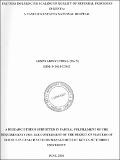Factors influencing scaling up quality of referral processes in Kenya.
Abstract
Scaling-up quality referral processes strengthens the health system. Referral refers to any process in which healthcare providers at lower levels of the health system seek the assistance of providers who are better equipped or specially trained to guide them in managing or to take over responsibility for a particular episode of a clinical condition in a patient. Quality in health care falls under Service delivery, which is one of the six key health system strengthening building blocks. The main objective of the study was to find out the factors influencing the scaling up quality of referral processes at Kenyatta National Hospital and the specific objectives of the study were to; establish how the management of referrals can scale up the quality of referral processes at Kenyatta National Hospital, determine how the pre-referral communication processes scale-up the quality of referral processes, and establish how referral staff can scale up quality of referral process. The Research design was a descriptive cross-sectional and retrospective study, data was collected using a questionnaire and check list. A check list was used and 384 referrals entered, a total of 100 self-administered questionnaires were completed by staffs working at Kenyatta National Hospital and returned. Data analysis was done using SPSS version 21 and presented in tables, bar graphs and pie charts, reliability was done to establish regression co-efficient at (95%) confidence interval. The findings revealed that majority of the respondents 80(79.8%) indicated the referring institutions do not understand the referral policy, guidelines and Standard Operating Procedures, 12(13.5%) showing that they know and 6(6.7%) indicating that they don't know, majority of patients, 75(75%) came with referral letters which were incomplete, 13(13.7%) lab results and 12(12%) coming with X-ray results. The findings indicates that 51(56%) of the referred patients came with nurse, 40(44%) relative with none being escorted by doctor. According to the findings 63(67%) of the referring hospitals did not call prior to referring the patient, only 31(33%) called before transferring the patient to KNH. In conclusion, the findings showed that there was significance relationship between referral policy and staff knowledge on referrals at P< 0.05 with chi square test of 0.004. Scaling up the referral processes ensures quality of referral services. The study recommends that the management of Kenyatta National Hospital needs to ensure that dissemination, sensitazation and awareness of the referral policy, guidelines and SOPs is done for the staffs both in the referring and receiving hospitals, referral tools, forms and registers be distributed at all levels of the health system for standardised information in the referral letters, laboratory and radiological investigations. Employ adequate human resource in the hospital.
Publisher
KeMU

